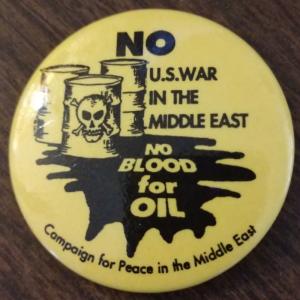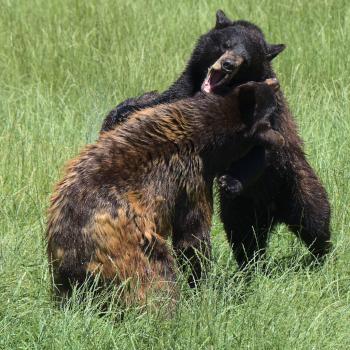“We got a thousand points of light
For the homeless man
We got a kinder gentler
Machine gun hand.”
— Neil Young, “Rockin’ in the Free World”, summarizing the political philosophy of George H.W. Bush
I woke up yesterday morning to the news that President Bush — the first President Bush — had died. The NPR reporter told a story about how Bush the First had told her that the happiest time of his life was not his Presidency or his campaign, but when he returned from World War II and was going back to school, with his wife and son at home waiting for him.
I’m sure the hearts of the ghosts of the estimated 13,000 Iraqi civilians who died in Gulf War I and the 70,000 who died in its aftermath were suitably warmed by this tale of domestic bliss.
War Crimes
With his Gulf War and his illegal attack on Panama which killed an estimated 300 to 2,000 innocents, Bush I made war cool again for a nation that, for a minute after Vietnam, started to think that maybe the answer to international conflict might not lie in killing on an industrial scale.
It’s certainly not a coincidence that his son gave us two illegal wars, one a direct sequel to his father’s attack on Iraq.
88,500 tons of bombs were dropped in Bush I’s brief war on Iraq — and 70% missed their targets. But even of the 30% that struck true, contrary to popular perception at the time the targets were not exclusively military but included civilian electrical and transportation infrastructure, destroyed to make Iraq more amenable to US demands.
Destroying the electrical infrastructure shut down water and sewage systems, and wrecking roads and rail meant food could not be transported. Tens of thousands of civilians died of starvation and epidemics of cholera and typhoid, as Bush gave us a new form of war, where massive air superiority destroyed a nation while it made American troops so safe that they were more likely to die by accident than in combat. (I vaguely remember a contemporary article that analyzed civilian accidental death rates and found that an American soldier involved in Gulf War I was statistically safer than a civilian, but I can’t find that now.)
War without risking American lives! And if a bunch of non-combatants died, well, it’s not like they were white or Christians or anything.
Or as if it would make the news. The narrative had already been set: The Gulf War was a Good War.
Nixonian Deceipt
Gulf War I was sold to the American people with lies about Iraqis killing babies and preparing to invade our close friends (cough) in Saudi Arabia.
It set the stage for his son to take us to Gulf War II under false pretenses, and was a suitably underhanded and deceptive strategy for the man who served the morally crippled monster Richard Nixon as UN ambassador and head of the RNC and Nixon’s chosen successor Ford as head of the CIA.
As CIA head, Bush resumed the covert intelligence community’s tradition of aiding right-wing dictators, covering up a terrorist attack by Pinochet’s secret police.
Just for his wars and his collusion with Nixon and Ford and his coverup of a state terror attack in the United States, if there is any sort of just afterlife Bush will spend thousands of years in hell realms.
But that’s hardly the only damning act that will weigh down George H.W. Bush’s soul.
As Reagan’s VP, he was an accomplice to the “Reaganomics” that started the decline of the American middle class.
And he was fully involved in the crimes of the Iran-Contra affair, including chairing a “Special Situation Group” which recommended covert operations including the mining of Nicaraguan waterways.
As President, Bush pardoned several of his Iran-Contra co-conspirators. Independent counsel Lawrence E. Walsh said that Bush’s pardons “undermine[d] the principle that no man is above the law” and “demonstrate[d] that powerful people with powerful allies can commit serious crimes in high office — deliberately abusing the public trust without consequence.”
Race Hate, Drug War, And Mass Incarceration
“Race baiting
Is the way to get selected
Willie Horton or
Will he not get elected…”
–“Television, The Drug Of The Nation”, Disposable Heroes Of Hiphoprisy
Bush became president by stoking the fires of racism with the famous Wille Horton ads. And once he got in he revived Nixon’s racist War on Drugs.
As Ethan Nadelmann, founder of the Drug Policy Alliance, put it, “Millions of Americans were incarcerated, hundreds of billions of dollars wasted, and hundreds of thousands of human beings allowed to die of AIDS – all in the name of a ‘war on drugs’ that did nothing to reduce drug abuse…[Bush] put ideology and politics above science and health.”
The clearest example of this is how he set up 19 year old African American Keith Jackson for a political stunt crack deal across from the White House, putting the young man in jail for eight years.
The federal prison population went up 39% in just four years under Bush, with 16,946 new prisoners — more new prisoners in four years than under eight years of Reagan. Bush was truly a pioneer of the carceral state.
“One nation under God”
Bush was at the center of the Republican Party during the rise of the Religious Right in the 1970s and 80s. He helped put a “kinder, gentler” face on the party’s turn to theocracy.
His contempt for atheists is dead center of our bailiwick here at The Zen Pagan. In 1987, Bush told atheist journalist Robert Sherman “I don’t know that Atheists should be considered as citizens, nor should they be considered patriots. This is one nation under God.”
Because the remark was made directly to Sherman and not recorded, and because Americans distrust atheists, many pundits have doubted whether Bush actually said that. But in a 2004 interview with Don Imus, Bush was publicly documented expressing much the same sentiment, saying “Lincoln said you cannot be President without spending some item on your knees. I have repeated that and a bunch of Atheists got all over me. Wait a minute. Does that mean that you cannot be President if you are an Atheist? I say yea that does mean that….One Nation Under God.”
Hagiographying Evil
Like the mainstream media’s reaction to the death of the monstrous John McCain, the hagiography now being constructed about Bush The First illustrates the moral rot at the heart of American politics, the ready acceptance of aggression abroad and human rights violations and exploitative economics at home.
If we’re ever going to get out of this pit, this dishonesty needs to stop. We must honestly identify the sins of our leaders, not bury them in some misguided idea about respect for the dead.
It’s time to stop hagiographying evil.
A Writer’s Debt
 All that said, as a writer there is a sense in which I owe George H.W. Bush a personal debt.
All that said, as a writer there is a sense in which I owe George H.W. Bush a personal debt.
I was an undergraduate student at the University of Maryland in 1991, and I’d had a handful of letters to the editor published in the campus newspaper, The Diamondback. But when I wrote about the Gulf War, I came into my campus job at the CPR Training Center at the University Health Center the next day to find that someone had cut out my op-ed and pinned it on the bulletin board. It was one of the few anti-war pieces to appear.
Writing against Bush’s war was the first time I threw a piece of writing out into the world — not just to a BBS or a USENET newsgroup, but the real world — and got a response, saw that my words had reached someone.
As a sort of tribute to that moment in history and a reminder that some Americans did indeed oppose Gulf War I at the time, here’s my letter. It remains disappointingly relevant, as our alliance with Saudi Arabia remains a problem, sanctions against an apartheid state (Israel, now, rather than South Africa) remain contentious, and foreign policy still seems to be based around keeping the oil flowing.
I opened the Diamondback today to find many pieces on the Gulf war (Pages of Opinion, January 22); but I found many more questions in my mind. George Bush tells us that our troops are there to stand up for human rights. I know I’ll never get an answer, but if we go to war for human rights, why did the U.S. government not invade South Africa? We were quite willing to give sanctions time to work there. Why was support given to South American dictators guilty of terrible human rights violations? Why are we allied with Saudi Arabia, where women have no rights, and religious freedom is non-existent? And why did the U.S.
government continue to deal with Hussein when he used poison gas against his own people? The “world’s policeman” seems to take a very selective view of which crooks to let go, and which crooks heads to bash in.Some say we’re there to liberate Kuwait. After this war, will there be any Kuwait left? Will we have to leave a force in Iraq to keep Kuwait “free”? Was Kuwait, a nation ruled by a monarchy, ever free to start with? David Grinberg advocates the use of nuclear weapons, if necessary, to win the war. Shall we leave Kuwait a nuclear wasteland? What are we going to do when we win this war?
And then there’s the fear that the real reason for war might be oil. George Bush mentions it; it came up again and again in the debates in Congress. Have we started a war in which unknown numbers of American, Israeli, and Iraqi citizens will be killed for oil? If we spent as much money and manpower on alternative fuel research as we are spending on the war, would we need Mid-East oil? If it’s all right to go to war for oil, and a “liberated” Kuwait decides not to sell us oil, will we invade Kuwait?
I was part of the anti-war demonstration in Lafayette Park on January 15th. Joe Rubin seems to think that makes me anti-American (“Gulf War sparks downtown rallies”, January 22). Isn’t it my responsibility as an American citizen to ask these questions, and to let the government know my opinions? Isn’t that what democracy is about? This isn’t about being against the troops. My fellow demonstrators included the relatives and friends of troops in the Gulf. Are they unpatriotic to question what the government is doing with their friends, children, brothers and sisters? Several Vietnam veterans joined in the protest; are they anti-American, or are they trying to prevent others from having to learn the hard lessons they did?
Some say it’s impractical to say that the war shouldn’t have begun. It’s already here, and we have to deal with it. But if war was wrong a week ago, isn’t it still wrong now? If it is wrong, what shall we do about it? Many people seem to think that we must stand behind George Bush, right or wrong. Isn’t that the very antithesis of democracy? Isn’t it more important to do what’s right than to support the president? These are the questions that keep me awake at night.

















